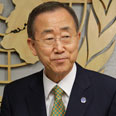UN Secretary General Ban Ki-moon said he expects Israel to attend an international conference on creating a Middle East nuclear-free zone he is aiming to hold this year in Helsinki.
"Israel will be invited and they should be there but nothing has been decided yet," Ban said late Wednesday, adding he had not raised the sensitive conference during talks with Prime Minister Benjamin Netanyahu in Jerusalem earlier.
Related stories:
- Palestinians hurl slippers at visiting UN chief
- IAEA, Iran to meet again after 'good' talks
- UN chief: No alternative to dialogue with Iran
Diplomats consider the presence of Israel and Iran would be crucial to the success of any conference, which was called for by the nuclear Non-Proliferation Review held in 2010.
Preparations are going ahead amid mounting Western concerns over Iran's nuclear program. Western countries accuse Iran of seeking a nuclear weapon. Iran denies the charge. Israel is widely believed to have an atomic arsenal but refuses to confirm or deny its existence.
The UN secretary general, who has made nuclear disarmament one of his priority issues, told a small group of reporters that he was "actively consulting the parties concerned" in preparing the conference.
"Considering all the presidential elections in major countries we are looking at the possibility of convening this meeting at the later stage of this year," Ban said, referring mainly to the US election.
The UN chief named Finland's undersecretary of state for foreign affairs, Jaakko Laajava, in October to be the main conference planner.
"Nothing has been decided for the exact date," Ban said. "I have received an initial report from my facilitator (Laajava), but it is going to happen," the secretary general said.
Ban said Iran was one of the regional topics that he discussed with Netanyahu but gave no details.
Meanwhile, UN nuclear experts' talks in Iran appear to have made little concrete progress, diplomats said on Thursday, setting the stage for a crucial second round this month over Western fears Tehran may aim to build atomic weapons.
Three days of discussions in Tehran which ended on Tuesday were a rare direct dialogue in the long-running international dispute, which has deepened as the West pursues a punitive embargo on Iranian oil and Tehran threatens retaliation. There are fears the confrontation could lead to a military conflict.
Reuters contributed to this report
- Receive Ynetnews updates
directly to your desktop
















